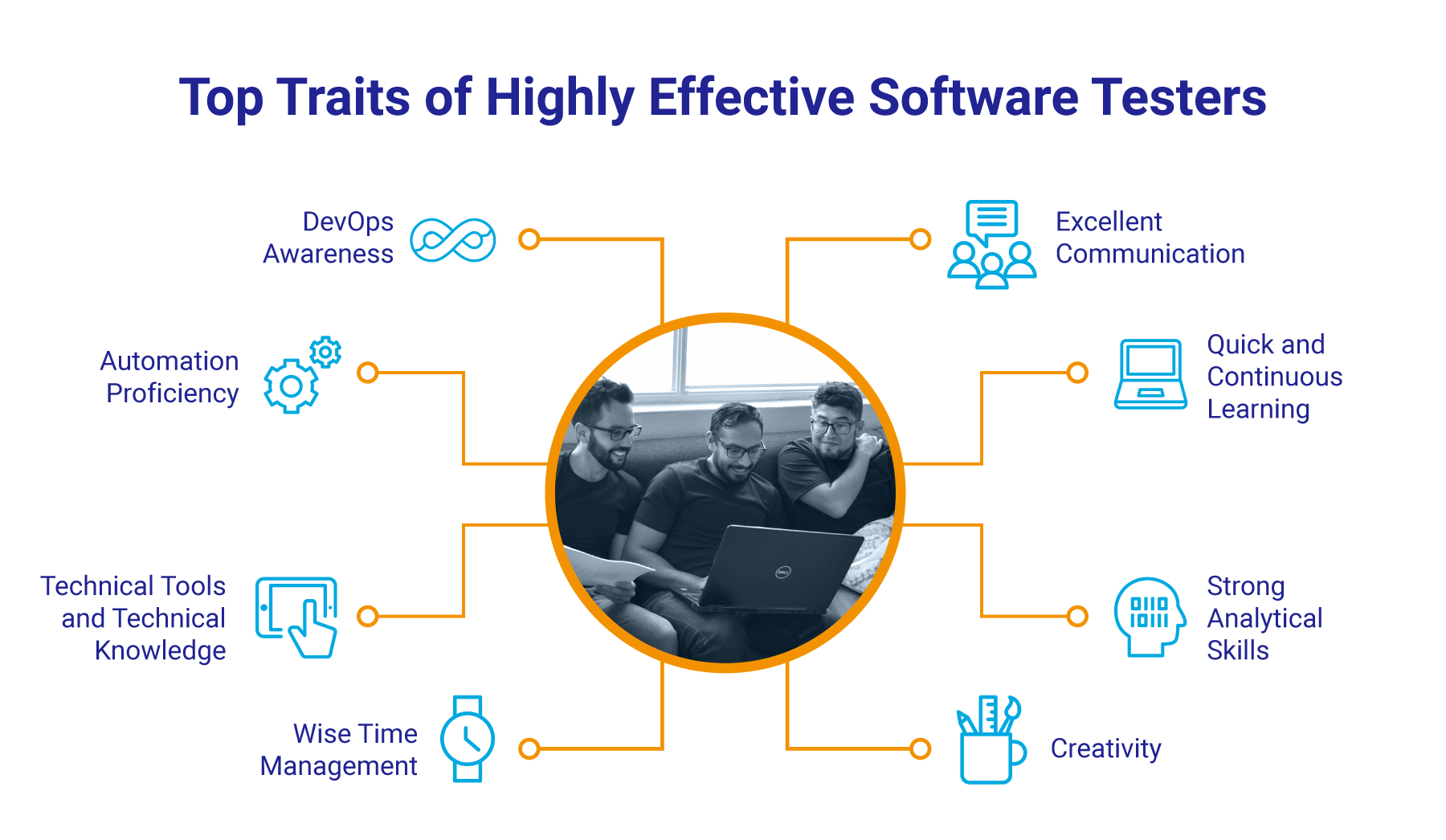Top Traits of Highly Effective Software Testers
May 7, 2019
8 Top Traits of Effective Software Testers
In the field of IT, new technologies develop and evolve rapidly. Likewise, the skills of an effective software tester must develop and evolve at the same pace. While there are characteristics that form the base skills required by a software tester, there are others that are supremely important given the increasing level of competition, and the increasingly complex role a software tester plays in today’s software development environment.These eight skills are what we consider the top qualities that an outstanding test engineer must have in these times of constant change.

Excellent Communication
Communication is a critical skill that everyone working in the IT field should possess. Nowadays, it has to be adapted on a global level in order to continue fostering security and confidence in any organization’s teams. Large companies are increasingly using global consultants, therefore, an excellent communicator must consider cultural aspects, since working and communicating with teams in different parts of the world can be challenging. For example, communicating with resources in India can be very different from interfacing with people from China or South America. It is paramount that a software tester develop excellent communication skills. Software testers need to be able to anticipate and disclose potential risks, actively participate in planning meetings, while maintaining professional communication at all times with developers, customers, and upper management, in both a technical and non-technical manner to avoid any ambiguity and inconsistency.Quick and Continuous Learning
With such a massive increase in application development and the advent of new web languages and technologies, there is a surging demand for knowledgeable test engineers. Quick.as well as continuous learning is of utmost importance for a test engineer, to enable them to maintain adaptability to new projects and new challenges presented to them. Although it is impossible to be an expert in every language and technology, a good tester should maintain a general knowledge of each, and should be open to learning new technologies as they emerge. The importance of being aware of the existence of new technologies and knowing the scenarios and types of tests in which they can be applied cannot be overstated.Strong Analytical Skills
Given the nature of the role of a software tester, the ability to analyze is essential. Many times we think that just testing basic negative cases is enough, but there are many other ways to make an application fail. Most times we take the happy path scenarios for granted, however we need to have a holistic approach with deep analysis to be able to raise all our test cases, plan the strategies, visualize the scenarios and validate our application in detail. An effective tester must apply this analysis to the results of their tests and use them for future executions. Constant meetings with developers and clients aid in a meticulous and effective analysis.Creativity
Creativity becomes important once ordinary test scenarios are completed. A good tester should start thinking out of the box and develop ideas that are not reflected in the requirements of the system about how the application can be used or what the end user can or cannot do. They should look for situations out of the ordinary and problems that other team members or even the client may not have considered. Curiosity about the system to be tested and its potential complements this attribute.Wise Time Management
It is critical for a highly effective tester to have a plan, and have their plan ready before any test execution activity. The definition of priorities is the basis for a wise handling of test times. The tester must be aware that every system to be tested comes with its delivery time, which will often be tight and pose a challenge… but results must still be delivered. A tester should identify and organize the most relevant scenarios or tests and determine the effort in their execution. This is essential to having excellent time management, complying with the deliverables. This also ensures any carry over will have the minimum level of impact on the project.Technical Tools and Technical Knowledge
In the IT industry there are different types of applications focused on different platforms, so during the testing process several types of tools are used. The effective tester needs to be equipped with an extensive knowledge of these testing tools so that they have the ability to define the best performance and financial aspects to achieve optimal execution. Tracking, Automation, API testing tools, etc., complement the technical knowledge that a tester must possess to be truly competent in this area. The ample technical knowledge that the tester possesses will facilitate communication with the development teams and enable them to report the findings, doubts or any necessary clarification clearly.Automation Proficiency
To excel, a highly effective tester has to be knowledgeable in test automation. They should be able to recognize which tests are beneficial to automate and at what stage or time they should be executed. It is necessary to identify the scenarios for regression tests since this translates into saved time and effort that can be used in test cases of greater detail or complexity.DevOps Awareness
This attribute has become indispensable. In recent years, DevOps has taken on an important role in the development of software, promoting a collaborative environment that helps a product enter production quickly even when highly complex. It is essential that the tester have knowledge of the processes that are involved since more and more teams are adopting these practices. Continuous Integration and Continuous Delivery (CI/CD) are terms that every highly effective software tester must know.Conclusion
It is easy to see the growing role and responsibilities of a software tester, and the need to stay at the forefront of technological progress. In the current climate, we believe that these skills are a “must have,” in order to become a highly effective software tester. We will leave it up to you to determine which ones are best suited to meet the needs of your market, your clients, and your organization.SHARE
Recent blog posts

Stay in Touch
Keep your competitive edge – subscribe to our newsletter for updates on emerging software engineering, data and AI, and cloud technology trends.



